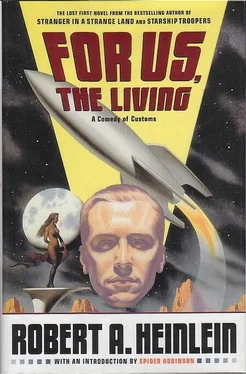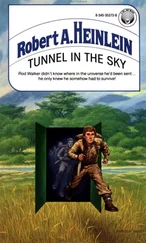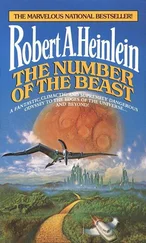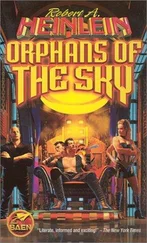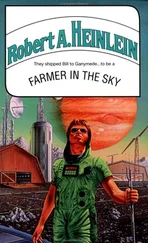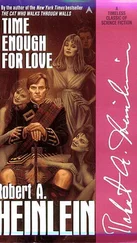Robert Heinlein - For Us, The Living
Здесь есть возможность читать онлайн «Robert Heinlein - For Us, The Living» весь текст электронной книги совершенно бесплатно (целиком полную версию без сокращений). В некоторых случаях можно слушать аудио, скачать через торрент в формате fb2 и присутствует краткое содержание. Жанр: Фантастика и фэнтези, на английском языке. Описание произведения, (предисловие) а так же отзывы посетителей доступны на портале библиотеки ЛибКат.
- Название:For Us, The Living
- Автор:
- Жанр:
- Год:неизвестен
- ISBN:нет данных
- Рейтинг книги:3 / 5. Голосов: 1
-
Избранное:Добавить в избранное
- Отзывы:
-
Ваша оценка:
- 60
- 1
- 2
- 3
- 4
- 5
For Us, The Living: краткое содержание, описание и аннотация
Предлагаем к чтению аннотацию, описание, краткое содержание или предисловие (зависит от того, что написал сам автор книги «For Us, The Living»). Если вы не нашли необходимую информацию о книге — напишите в комментариях, мы постараемся отыскать её.
For Us, The Living — читать онлайн бесплатно полную книгу (весь текст) целиком
Ниже представлен текст книги, разбитый по страницам. Система сохранения места последней прочитанной страницы, позволяет с удобством читать онлайн бесплатно книгу «For Us, The Living», без необходимости каждый раз заново искать на чём Вы остановились. Поставьте закладку, и сможете в любой момент перейти на страницу, на которой закончили чтение.
Интервал:
Закладка:
"I don't know how to answer you, Diana. We knew it in the navy of course, and we kept them clean and healthy and well fed, but to say that any government official would naturally know that—well, either men have grown very much wiser in a hundred and fifty years or something has happened to change the point of view."
"I don't believe that we are any smarter than people were in your day. I don't think such a thing is possible in four or five generations. But I don't see how anyone could be so short-sighted."
"Even if an official did have your viewpoint and wanted to do something, he would be bound to ask 'where is the money to come from?'. And no one could answer him. Cost of government was already too high."
"Where is the money to come from, Perry? Why, I never heard such silly talk. Where does any money come from? When the government sees a need for exchange, it creates it, of course. Why you had that in your day, Perry. It says right there in the original constitution, 'Congress shall have the sole right to coin money and regulate the value thereof.'"
"Yes, I remember that phrase. But that isn't the way it worked out in my day. Money was created by the banks, most of it at least—the important part anyhow. If the government needed money and couldn't raise it via taxes in time, it borrowed from the banks."
"But I don't understand—the banks are a part of the government."
"Not in my day. They were private institutions. It might be proper to say that the banks were the government. In some ways they were stronger than the government."
"But that would be sheer blind anarchy!"
"It was—pretty much."
"But see here, Perry. All this doesn't check. You came from 1939 when Franklin Roosevelt was president. I don't know a whole lot about history, but I do know that he is regarded as the first man in the new economic era. Why, there is a statue of him in Washington, showing him feeding the hungry."
"Yes, Mr. Roosevelt knew that all right. But he got very little cooperation, even from those he was trying to help. But it's my turn to ask questions: Tell me, is there no longer anyone hungry?"
"Of course not. Not in the United States at least."
"I meant the United States. Are there any sick?"
"Oh yes. Not many of course."
"What happens to them?"
"They are treated and taken care of to make them well. What else could you do?"
"Never mind. Is anyone out of work?"
"Out of work? Do you mean not working for money? Of course. At any one time I don't suppose you will find more than half the population working to make money."
"Don't those that work object to working while the others are idle?"
"Why should they? Everybody can't work all the time or nobody would have time to use what he has produced—no time to spend his credit. Everybody works whenever he feels the need of replenishing his credit—or if he has an occupation that he likes whether he needs more credit or not."
"Does everybody work part time?"
"No. Most professional people work regularly because they like to. Take a surgeon for example. He will work forty weeks every year. If he is famous and loves his work, his vacation will be as busy as his credit work. Take me for example, I work every week now and have for quite a long time, a broadcast like tonight every week, not to mention recordings for stories and songs."
"Is that one broadcast all the work you do?"
"I have to rehearse a lot and I'm expected to invent a new dance each week."
"How about people that aren't professional people, the various kinds of skilled or semi-skilled labor, and tradesmen and so forth."
"Some work full time and some part time. Quite a number of people work for several years and then quit. Some people don't work at all—not for money at least. They have simple tastes and are content to live on their heritage, philosophers and mathematicians and poets and such. There aren't many like that however. Most people work at least part of the time."
"Diana, is the United States a socialism now?"
"Why no, not if by socialism you mean government ownership of the factories and stores and farms and such. New Zealand has that kind of a government and I believe it works pretty well, but I don't believe it would be suited to the American temperament. But see here, Perry, I'm no economist. I've got a pal at the University of California who is. I'll get him to run up here in a day or two after you've studied up on history a little and he will be able to answer all of your questions. Which reminds me. If you are to have those recordings tomorrow, I had better order them." She stepped to the communicator. Perry heard her calling the University of California at Berkeley.
"Will you be able to order at this time of night?" he enquired.
"Probably not, not without paying an excessively high bonus. I'll simply set for recorded message and they will get the order first thing in the morning."
"How do you do that?"
"Either one of two ways. I can have my voice recorded, or write with the telautograph. Want to see the telautograph work, Perry?"
He stepped over to her side. "They haven't changed much."
"Do you mean to say that you could telewrite in 1939?"
"Uh huh. They weren't used much, but I remember seeing one in the Union Station in Kansas City. It was used for train orders."
"Hm—, maybe our mechanical marvels aren't going to surprise you as much as I had thought."
"I'm sure I'll find plenty to amaze me. But remember, Dian'. I was an engineer albeit in 1939. I take it you are an artist primarily. I may not be impressed at the things that you expect will impress me."
"That's probably true." She wrote slowly with the telautograph, stopping several times to think. Finally she signed it and closed the machine. "That will do for now. I've ordered a general catalog too so that you can pick out any records you may be interested in."
"Do you buy these records?"
"No, not unless you want to. There is a small charge for using them. If you find you want to keep a record permanently, you can pay for it and keep it."
"Do you have any here?"
"Oh yes, but not very many except for my professional library. I have quite a number of those, recordings of my own dances of course and a lot more of every sort of dancing. Most of the others are story records, just for amusement. Want to see some of them?
"Sure."
"I'll show you how to use the receiver as a reproducer at the same time. Now watch. This is the adapter switch. Turn it to 'rep'. Then you put the record in like so and fasten the end of the film with this catch. Then press the power button. No, don't do it yet. You control the volume of sound with this dial. Now push the power button." The machine whirred softly and the large screen came to life. A fool in motley appeared and laughed sardonically in their faces.
"Hi, brother fool," he shouted, "You want another of Touchstone's tales? Then gather round and attend me well. Touchstone Tells the Tale! Many, many years ago in ancient Greece there lived a wench of monstrous humor." A large hook appeared from the side of the screen and settled about the jester's middle. His grin changed to dismay and broke into a thousand pieces, reformed and spelled Lysistrata: A Comedy of Manners. Diana noticed Perry's reflex of recognition.
"You know it then?"
"Yes. Oh yes."
"Shall I turn it off?"
"No. Please don't." For the next hour they laughed and chuckled over the ageless farce of marriage and war. Perry was particularly delighted to recognize Diana among the Grecian wenches, and pointed out his discovery with a glee. Diana looked pleased, but protested when Perry insisted in whispers that Diana should have had the leading role.
Presently the play came to its rollicking finish, and the machine clicked to a stop. Perry found Diana smothering a yawn. She made a face at him. "Sorry, but I was up earlier than you were."
Читать дальшеИнтервал:
Закладка:
Похожие книги на «For Us, The Living»
Представляем Вашему вниманию похожие книги на «For Us, The Living» списком для выбора. Мы отобрали схожую по названию и смыслу литературу в надежде предоставить читателям больше вариантов отыскать новые, интересные, ещё непрочитанные произведения.
Обсуждение, отзывы о книге «For Us, The Living» и просто собственные мнения читателей. Оставьте ваши комментарии, напишите, что Вы думаете о произведении, его смысле или главных героях. Укажите что конкретно понравилось, а что нет, и почему Вы так считаете.
